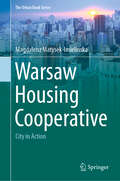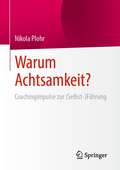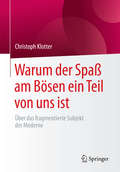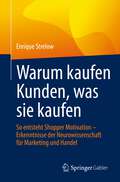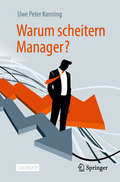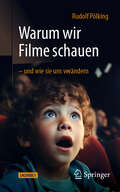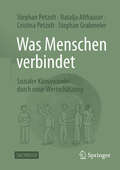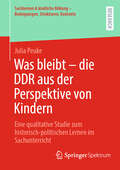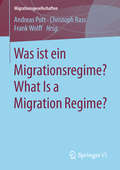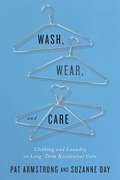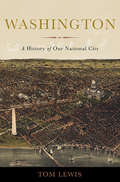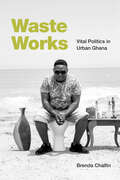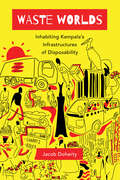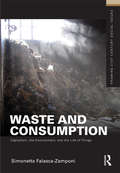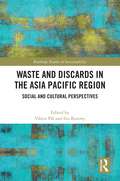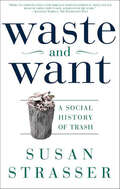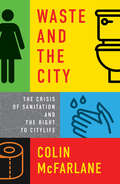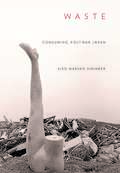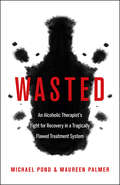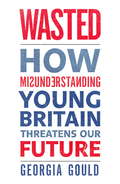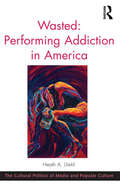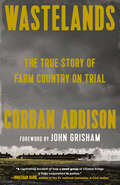- Table View
- List View
Warsaw Housing Cooperative: City in Action (The Urban Book Series)
by Magdalena Matysek-ImielińskaThis book discusses the unknown and remote urban experiment of modernist social practices and dreams of a better tomorrow. It describes the history of the Warsaw Housing Cooperative not as a historical relic or a single case study, but instead analyses this working-class social housing estate – in itself an extremely interesting emancipatory project – from the perspective of contemporary urban studies.It focuses on issues related to the power of architecture, architects and the estate residents themselves: the city's performative actions, problems related to the polycentric character of the city authorities, the opportunities of building urban institutions, and social identities and urban common goods. Inspired by the history of the Warsaw Housing Cooperative, the book investigates how the estate residents, assisted by social reformers (today called urban activists), organised the urban space of performative democracy, and how they developed anti-capitalist, urban-survival strategies and created new lifestyles. It also analyses how passive tenants turned into active citizens claiming their right to the city.The inspiring book is intended for researchers in the field of performative studies, urban sociologists, critical urban studies researchers, animators of social life and urban activists.
Warum Achtsamkeit?: Coachingimpulse zur (Selbst-)Führung
by Nikola PlohrDas Buch folgt dem Anliegen, einen Dialog zu eröffnen und zum Nachdenken und Reflektieren anzuregen. Der Prozess, durch den das Buch die Leser*Innen leitet ist für alle geeignet, die sich mehr mit sich selbst und ihren inneren Mustern beschäftigen möchten und auch offen sind für neue Anregungen im Umgang mit anderen. Der Text führt von innen nach außen, aus der Theorie in die Praxis und aus der Reflexion ins Tun. Der erste Teil, Inner Leadership, widmet sich den vielschichtigen Möglichkeiten zur Selbstreflexion, die für das zeitgenössische Verständnis von Führung unabdinglich ist. Achtsamkeit hält als Praxis und Begriff den Raum für die Hinwendung zum Innenleben, den inneren Geschichtenerzähler*Innen, dem individuellen Umgang mit Kritik, Emotionen und dem allgegenwärtigen Streben nach Anerkennung. Im zweiten Teil wird die teambasierte Führungspraxis in den Fokus gerückt. Unter dem Schlagwort Mindful Leadership werden einige der vielen zwischenmenschlichen Ebenen und Verbindungen beleuchtet, die nicht nur das Arbeitsleben prägen. Darunter: Kommunikation, Inspiration, Mut, Entscheidungen, sowie Zugehörigkeit und Nachhaltigkeit. Jedes Kapitel endet mit Reflexionsfragen und Übungen, die aus der Theorie in die Praxis überleiten.
Warum der Spaß am Bösen ein Teil von uns ist
by Christoph KlotterIn der Auseinandersetzung mit de Sade und Freud erhält der Leser eine Anregung, die Geschichte des Bösen neu zu denken, das Böse als Teil des Menschen und seiner Kultur zu denken. Neben Errungenschaften wie Demokratie, Menschenrechten und persönlicher Freiheit wird nämlich zu oft vergessen, dass dieser Kultur auch Schattenseiten innewohnen. Dass der Mensch fragmentiert ist, widersprüchlich fühlt und handelt, wird negiert. Als Folge vertieft sich seine Zerrissenheit. Das Buch ist somit auch eine Anregung für die wachsende Anzahl derer, die sich derzeit darüber Gedanken machen, warum das Böse offenkundig erstarkt und sich ungehemmt zeigt.
Warum kaufen Kunden, was sie kaufen: So entsteht Shopper Motivation – Erkenntnisse der Neurowissenschaft für Marketing und Handel
by Enrique StrelowDieses Buch liefert eine Vielzahl von Anregungen, Ladengeschäfte und die Präsentation der Ware so zu gestalten, dass dem Kunden die Kaufentscheidung leichter fällt und die Kauffreude wächst. Der unterhaltsam geschriebene Text enthält viele Insights aus der Praxis. Enrique Strelow rückt die Marken- und Werbewirkung in eine neue Perspektive, weil er den Kaufakt aus der Sicht des Kaufenden betrachtet und mit den Erkenntnissen der Neuroscience analysiert. Das bereichert die Vorstellungswelt und Gestaltungsspielraum von Verkäufern, Händlern und Marketiers. Dies ist ein Buch für Praktiker. Es werden die wissenschaftlichen Erkenntnisse der Shopper NeuroScience im Hinblick auf ihre praktische Relevanz „vor Ort“ verständlich dargestellt. Da es für alle Praktiker insbesondere um Umsatz geht, gibt es im Buch zahlreiche Anregungen, Beispiele und Bebilderungen. Ein wichtiges Buch für alle, die Umsätze generieren wollen oder müssen.Aus dem InhaltErkenntnisse der Hirnforschung und ihre Bedeutung für Marketing, Sales und HandelWarum zwei Drittel aller neu eingeführten Marken und Produkte floppen – und was man dagegen tun kannWarum der Preis eine wichtige Rolle spielt, aber beileibe nicht die einzige Möglichkeit ist, einen Shopper zu motivierenWie Licht und Beleuchtung die Shopper Motivation positiv beeinflussenLeserstimmenDieses Buch ist anders als andere Bücher. Es lockt nicht mit schnellen Patentlösungen, die oftmals zu folgenreichen und kostspieligen Entscheidungen führen, sondern bricht mit vertrauten Denk- und Handlungsmustern. Dabei zeigt es Optimierungspotenziale auf. Eine lohnenswerte Lektüre! Heinz Zurheide, Zurheide Feine Kost KG„Enrique Strelow begleitet uns schon seit vielen Jahren. Viele seiner innovativen und wirksamen Ideen haben die Umsätze unserer Märkte beflügelt.“ Karsten Nüsken, Edeka Nüsken, Soest„Seit einigen Jahren leistet Enrique Strelow wichtige Beiträge zur Inszenierung und Licht-Gestaltung unserer Neu-Eröffnungen und Markt-Modernisierungen. Die Umsatzentwicklung spricht eindeutig für die Qualität seiner Konzepte.“ Andreas Nolte, Edeka Nolte, Wiesbaden
Warum scheitern Manager?
by Uwe Peter KanningManagementfehler haben mitunter weitreichende Konsequenzen für viele Menschen, die davon unmittelbar oder indirekt betroffen sind. Fast jeder kennt Fälle in seinem Umfeld oder glaubt Betroffener von Managementfehlern zu sein. Wenn Sie wissen möchten, wie Managementfehler entstehen und wodurch sie sich ein Stück weit eindämmen lassen, ist dieses Buch genau richtig für Sie, denn hier werden beispielsweise die folgenden Fragen beantwortet: Wie wird man (Spitzen-)Manager*in?An welchen Eigenschaften scheitern Manager*innen? Warum treffen Manager*innen Fehlentscheidungen?Wie täuschen Manager*innen sich und andere?Warum werden sie nicht frühzeitig gestoppt? Anhand von interessanten Informationen und Stories erhalten Sie einen Einblick in konkrete und bekannte Fälle von Missmanagement. Aufgrund der augenöffnenden Analyse, die auf psychologischen Erkenntnissen basiert, können Sie wertvolle Schlussfolgerungen ziehen. Zielgruppen: Berufstätige und alle, die sich ein gutes Management wünschen, sowie diejenigen, die Führungskräfte, Manager und Managerinnen, einstellen, sie führen oder mit ihnen zusammenarbeiten. Zum Autor: Prof. Dr. phil. habil. Uwe Peter Kanning ist Professor für Wirtschaftspsychologie an der Hochschule Osnabrück. Er ist Autor zahlreicher Bücher. Seine Arbeit wurde vielfach ausgezeichnet, u.a. 2016 „Professor des Jahres“ (UnicumBeruf) oder 2019 Wahl unter die „40 führenden Köpfe des Personalwesens“ (Personalmagazin). Seit 1997 berät er Unternehmen und Behörden bei wirtschaftspsychologischen Fragestellungen.
Warum wir Filme schauen – und wie sie uns verändern
by Rudolf PölkingFilmerlebnisse prägen uns. Filme sprechen sehr viele Teile unserer Persönlichkeit an. Während des Schauens werden unterschiedliche innerpsychische, physische und gesellschaftliche Prozesse in Gang gesetzt. Einige von diesen sind bis dato kaum im Fokus der Öffentlichkeit. Dass Medienwelten uns verändern, gilt als weitgehend unbestritten. Doch worauf beruht diese Wirkung und welche Folgen hat sie, insbesondere solche, die bislang wenig Beachtung finden?Dieses Buch geht diesen Fragen nach. Es beleuchtet die Vielfalt innerer und äußerer Wirkmechanismen, die beim Filmgenuss aktiv werden. Eine mögliche Konsequenz der neuen virtuellen Welten kann Mediensucht sein. Weitreichender jedoch ist der kulturelle Wandel, der sich durch unsere zunehmende Hinwendung zu Filmwelten und sozialen Medien vollzieht – eine Zeitenwende, deren Dynamik gerade erst beginnt.
Was Menschen verbindet: Sozialer Klimawandel durch neue Wertschätzung
by Stephan Petzolt Natalja Althauser Cristina Petzolt Stephan GrabmeierDieses Buch entwickelt die relevanten Facetten von Wertschätzung und zeigt die Verbindung zu Wertschöpfung in Zeiten von Industrie 4.0, der Digitalisierung und des Klimawandels auf. Dabei wird deutlich, dass Wertschätzung sowohl für den Einzelnen, als auch für das Miteinander einen besonderen Stellenwert hat. Wertschätzung sorgt für Selbstbewusstsein, Selbstwirksamkeit und bildet die Grundlage für adäquate Kommunikation auf Augenhöhe. Auf organisationaler Ebene bewirkt Wertschätzung eine Verminderung von Komplexität und ermöglicht angstfreie Räume ohne Repressalien. Das Buch zeigt neue Formen der Wertschöpfung, in denen Risiken und Fehler frühzeitig erkannt werden und der Auftrag der Organisation im Zentrum kollektiver Aktivitäten steht. Darüber hinaus bietet Wertschätzen praktische Anregungen sowohl zur individuellen als auch organisationalen Weiterentwicklung.
Was bewirkt Psychologie in Arbeit und Gesellschaft? (Der Mensch im Unternehmen: Impulse für Fach- und Führungskräfte)
by Christoph Negri Maja GoedertierWas bewirkt Psychologie in Arbeit und Gesellschaft?Zum hundertjährigen Bestehen des IAP, dem Institut für Angewandte Psychologie in Zürich, bietet dieses IAP Jubiläumsbuch einen reflektierten Überblick sowie wertvolle Einblicke in die vielfältigen Tätigkeits- und Forschungsbereiche des IAP in der Angewandten Psychologie.Basierend auf dem Erkenntnisgewinn von einhundert Jahren zeigt es auf, wie die Angewandte Psychologie als zentrale Bereicherung für die Gesellschaft und die Arbeitswelt wirkt und wie sich die Angewandte Psychologie über diese Zeitspanne weiterentwickelt hat. Anschauliche Beispiele und fundierte Erkenntnisse von Psychologinnen und Psychologen zu folgenden Themengebieten machen diese Lektüre für jeden zu einer Bereicherung:Historie und Zukunft der psychologischen Tätigkeit am IAPPsychologische Diagnostik und BeratungFührungLehren und LernenCoachingLaufbahngestaltungOrganisationsberatung Jedes Kapitel enthält:Kurzreflexion mit Hinweisen, woher das Wissen am IAP stammtInsights in die aktuellen Tätigkeitsfelder und was das IAP bieten kannAusblick und zukunftsgerichtete TrendsZusätzlich ist das Buch mit digitalen Beiträgen, d.h. Videoclips, angereichert. Zu den HerausgebendenProf. Dr. Christoph Negri ist Leiter des IAP Institut für Angewandte Psychologie an der ZHAW Zürcher Hochschule für Angewandte Wissenschaften. Seit 2015 führt er am IAP verstärkt neue Entwicklungen im Bereich Lernen und Lehren ein und treibt den digitalen Wandel im Institut und in der Weiterbildung und Dienstleistung voran.Maja Goedertier ist Beraterin am IAP Institut für Angewandte Psychologie an der ZHAW Zürcher Hochschule für Angewandte Wissenschaften. Ihr psychologisches Wissen und Können, verbindet sie mit langjähriger Erfahrung als psychologische Beraterin.
Was bleibt - die DDR aus der Perspektive von Kindern: Eine qualitative Studie zum historisch-politischen Lernen im Sachunterricht (Sachlernen & kindliche Bildung – Bedingungen, Strukturen, Kontexte)
by Julia PeukeDer Zeitgeschichte wird aufgrund ihrer Nähe zur Gegenwart und der Zugänglichkeit zu Quellen besonderes Potenzial für das historisch-politische Lernen im Sachunterricht zugeschrieben. Ausgehend von diesem Grundgedanken befasst sich das vorliegende Buch mit der Frage, welche Theorien Kinder zur DDR und damit auch zur deutschen Teilungsgeschichte haben und wie sich diese in den Diskurs zum zeithistorischen Lernen in der Grundschule einordnen lassen. Dabei wird zudem das Machtkonzept der Kinder vertieft in den Blick genommen. Anhand der Befunde der qualitativen Studie wird die Verschränkung von Zeitgeschichte mit politischen Konzepten und somit auch dem historischen und politischen Lernen deutlich.
Was ist ein Migrationsregime? What Is a Migration Regime? (Migrationsgesellschaften Ser.)
by Andreas Pott Christoph Rass Frank WolffDer Begriff des Migrationsregimes erfreut sich großer Beliebtheit. Er verspricht einen analytischen Zugriff auf die Komplexität der Beziehung von Migration und Regulation. Dabei wird er jedoch sehr unterschiedlich genutzt und gedeutet. Die Herausgeber des Sammelbandes verstehen diese Vielstimmigkeit als einen Aufruf zur Debatte. Aufbauend auf einem längeren Austauschprozess auf Tagungen und Workshops haben sie Forscher*innen, die zentrale Fachrichtungen einer interdisziplinären Migrationsforschung und deren unterschiedliche Perspektiven vertreten, eingeladen, die Grundannahmen, Potentiale und Herausforderungen des Ansatzes zu diskutieren. Die so versammelten kritischen Einsichten in ein Schlüsselkonzept der modernen Migrationswissenschaft leuchten Wege aus, wie Fragen von Machtverteilung, Agency und Aushandlung systematischer in die Migrationsforschung einbezogen werden können.
Wash, Wear, and Care: Clothing and Laundry in Long-Term Residential Care
by Pat Armstrong Suzanne DayClothing and appearance are steeped in social and personal significance, conveying individuals’ gender, class, culture, and occupation. In the communal setting of long-term residential care, where residents’ autonomy and mobility are often limited but their dignity and identity are paramount, clothes have become crucial issues and the source of tension for residents, their families, and staff. Assessing the neglected but important labour involved in ensuring that clothes promote respect for both the washers and the wearers, Wash, Wear, and Care analyzes the roles that laundry and clothing play in nursing homes, and raises questions about the wider social, political, economic, and historical contexts of these facilities. Drawing on interviews and observations from twenty-seven long-term residential care homes across Canada, Germany, Norway, Sweden, the United Kingdom, and the United States, Pat Armstrong and Suzanne Day provide an extensive and vital base of information on the daily organization, tasks, meanings, and concerns associated with clothing, laundry, dressing, and appearance in care facilities. An original study of an overlooked subject, Wash, Wear, and Care illuminates the shifting political and economic dynamics at work in long-term residential care homes and the health care system, raising larger theoretical and policy questions in the process.
Wash, Wear, and Care: Clothing and Laundry in Long-Term Residential Care
by Pat Armstrong Suzanne DayClothing and appearance are steeped in social and personal significance, conveying individuals’ gender, class, culture, and occupation. In the communal setting of long-term residential care, where residents’ autonomy and mobility are often limited but their dignity and identity are paramount, clothes have become crucial issues and the source of tension for residents, their families, and staff. Assessing the neglected but important labour involved in ensuring that clothes promote respect for both the washers and the wearers, Wash, Wear, and Care analyzes the roles that laundry and clothing play in nursing homes, and raises questions about the wider social, political, economic, and historical contexts of these facilities. Drawing on interviews and observations from twenty-seven long-term residential care homes across Canada, Germany, Norway, Sweden, the United Kingdom, and the United States, Pat Armstrong and Suzanne Day provide an extensive and vital base of information on the daily organization, tasks, meanings, and concerns associated with clothing, laundry, dressing, and appearance in care facilities. An original study of an overlooked subject, Wash, Wear, and Care illuminates the shifting political and economic dynamics at work in long-term residential care homes and the health care system, raising larger theoretical and policy questions in the process.
Washington: A History of Our National City
by Tom LewisOn January 24, 1791, President George Washington chose the site for the young nation’s capital: ten miles square, it stretched from the highest point of navigation on the Potomac River, and encompassed the ports of Georgetown and Alexandria. From the moment the federal government moved to the District of Columbia in December 1800, Washington has been central to American identity and life. Shaped by politics and intrigue, poverty and largess, contradictions and compromises, Washington has been, from its beginnings, the stage on which our national dramas have played out. In Washington, the historian Tom Lewis paints a sweeping portrait of the capital city whose internal conflicts and promise have mirrored those of America writ large. Breathing life into the men and women who struggled to help the city realize its full potential, he introduces us to the mercurial French artist who created an ornate plan for the city “en grande”; members of the nearly forgotten anti-Catholic political party who halted construction of the Washington monument for a quarter century; and the cadre of congressmen who maintained segregation and blocked the city’s progress for decades. In the twentieth century Washington’s Mall and streets would witness a Ku Klux Klan march, the violent end to the encampment of World War I “Bonus Army” veterans, the 1963 March on Washington for Jobs and Freedom, and the painful rebuilding of the city in the wake of Martin Luther King, Jr. ’s assassination. “It is our national center,” Frederick Douglass once said of Washington, DC; “it belongs to us, and whether it is mean or majestic, whether arrayed in glory or covered in shame, we cannot but share its character and its destiny. ” Interweaving the story of the city’s physical transformation with a nuanced account of its political, economic, and social evolution, Lewis tells the powerful history of Washington, DC—the site of our nation’s highest ideals and some of our deepest failures.
Waste Works: Vital Politics in Urban Ghana
by Brenda ChalfinIn Waste Works, Brenda Chalfin examines Ghana’s planned city of Tema, theorizing about the formative role of waste infrastructure in urban politics and public life. Chalfin argues that at Tema’s midcentury founding, a prime objective of governing authorities was to cultivate self-contained citizens by means of tightly orchestrated domestic infrastructure and centralized control of bodily excrement to both develop and depoliticize the new nation. Comparing infrastructural innovations across the city, Chalfin excavates how Tema residents pursue novel approaches to urban waste and sanitation built on the ruins of the inherited order, profoundly altering the urban public sphere. Once decreed a private matter to be guaranteed by state authorities, excrement becomes a public issue, collectively managed by private persons. Pushing self-care into public space and extending domestic responsibility for public well-being and bodily outputs, popularly devised waste infrastructures are a decisive arena to make claims, build coalitions, and cultivate status. Confounding high-modernist ideals, excremental infrastructures unlock bodily waste’s diverse political potentials.
Waste Worlds: Inhabiting Kampala's Infrastructures of Disposability (Atelier: Ethnographic Inquiry in the Twenty-First Century #6)
by Jacob DohertyUganda's capital, Kampala, is undergoing dramatic urban transformations as its new technocratic government seeks to clean and green the city. Waste Worlds tracks the dynamics of development and disposability unfolding amid struggles over who and what belong in the new Kampala. Garbage materializes these struggles. In the densely inhabited social infrastructures in and around the city's waste streams, people, places, and things become disposable but conditions of disposability are also challenged and undone. Drawing on years of ethnographic research, Jacob Doherty illustrates how waste makes worlds, offering the key intervention that disposability is best understood not existentially, as a condition of social exclusion, but infrastructurally, as a form of injurious social inclusion.
Waste and Consumption: Capitalism, the Environment, and the Life of Things (Framing 21st Century Social Issues)
by Simonetta Falasca-ZamponiThis book examines the link between waste and consumption through a cultural approach that integrates environmental concerns with reflections on the role that consumption has come to occupy in our contemporary capitalist societies. The mutual relationship between capitalism and consumption is addressed along with early critiques of industrialization that exposed environmental problems. Toxic waste and its illegal dumping are examined, along with the problem of abuse of poorere areas and nations when it comes to disposing of toxic material. The question of solutions to the problems created by consumption and waste is raised and the claim is advanced that we do not necessarily need to stop being consumers. This timely book can be used in introductory sociology, social problems, and classes on environment and sustainability. This book is part of the Framing 21st Century Social Issues Series which offers readable, teachable "thinking frames" on today's social problems and social issues by leading scholars, all in short 60 page or shorter formats, and available for view on http://routledge.customgateway.com/routledge-social-issues.html. For instructors teaching a wide range of courses in the social sciences, the Routledge Social Issues Collection now offers the best of both worlds: originally written short texts that provide "overviews" to important social issues as well as teachable excerpts from larger works previously published by Routledge and other presses.
Waste and Discards in the Asia Pacific Region: Social and Cultural Perspectives (Routledge Studies in Sustainability)
by Viktor Pál Iris BorowyThis book uncovers, explores and analyses the cultural and social factors and values that lie behind waste making, recycling and disposal in the Asia Pacific region, where impressive economic growth has led to significant increases in production, consumption and concomitant waste production. This volume demonstrates the immense scope of waste as a multi-sectoral phenomenon, covering discussions on food, menstrual products, sewage, electronics, scrap, nuclear waste, plastics, and even entire villages as they are submerged underwater by dam building, considered expendable in favour of economic growth. It discusses the wide range of approaches and contexts through which people interact with waste, including socio-economic analysis, participatory observation, laboratory science, art, video, installations, literature and photography. Case studies focusing on India, China and Japan, in addition to other regional examples, demonstrate the ubiquity of waste, materially and geographically. It examines the duality of waste management, fostering community building while simultaneously excluding marginalised groups; how it can be linked to efforts creating circular economies, to then reappear in oceanic garbage patches; or technical waste repurposed for high-tech laboratory research before being discarded once again. This timely and wide-ranging collection of essays will be an important read for scholars, researchers and students in sustainability, development studies, discard studies, and social and cultural history, particularly focusing on countries in the Asia-Pacific.
Waste and Want: A Social History of Trash
by Susan StrasserAn unprecedented look at that most commonplace act of everyday life--throwing things out--and how it has transformed American society.Susan Strasser's pathbreaking histories of housework and the rise of the mass market have become classics in the literature of consumer culture. Here she turns to an essential but neglected part of that culture--the trash it produces--and finds in it an unexpected wealth of meaning. Before the twentieth century, streets and bodies stank, but trash was nearly nonexistent. With goods and money scarce, almost everything was reused. Strasser paints a vivid picture of an America where scavenger pigs roamed the streets, swill children collected kitchen garbage, and itinerant peddlers traded manufactured goods for rags and bones. Over the last hundred years, however, Americans have become hooked on convenience, disposability, fashion, and constant technological change--the rise of mass consumption has led to waste on a previously unimaginable scale.Lively and colorful, Waste and Want recaptures a hidden part of our social history, vividly illustrating that what counts as trash depends on who's counting, and that what we throw away defines us as much as what we keep.
Waste and the City: The Crisis of Sanitation and the Right to Citylife
by Colin McFarlaneSanitation is fundamental to urban public life and health. We need Sanitation for All.In an age of pandemics the relationship between the health of the city and good sanitation has never been more important. Waste in the City is a call to action on one of modern urban life&’s most neglected issues: sanitation infrastructure. The Covid-19 pandemic has laid bare the devastating consequences of unequal access to sanitation in cities across the globe. At this critical moment in global public health, Colin McFarlane makes the urgent case for Sanitation for All.The book outlines the worldwide sanitation crisis and offers a vision for a renewed, equitable investment in sanitation that democratises and socialises the modern city. Adopting Henri Lefebvre&’s concept of &‘the right to the city&’, it uses the notion of &‘citylife&’ to reframe the discourse on sanitation from a narrowly-defined policy discussion to a question of democratic right to public life and health. In doing so, the book shows that sanitation is an urbanizing force whose importance extends beyond hygiene to the very foundation of urban social life.
Waste: Consuming Postwar Japan
by Eiko Maruko SiniawerIn Waste, Eiko Maruko Siniawer innovatively explores the many ways in which the Japanese have thought about waste—in terms of time, stuff, money, possessions, and resources—from the immediate aftermath of World War II to the present. She shows how questions about waste were deeply embedded in the decisions of everyday life, reflecting the priorities and aspirations of the historical moment, and revealing people’s ever-changing concerns and hopes.Over the course of the long postwar, Japanese society understood waste variously as backward and retrogressive, an impediment to progress, a pervasive outgrowth of mass consumption, incontrovertible proof of societal excess, the embodiment of resources squandered, and a hazard to the environment. Siniawer also shows how an encouragement of waste consciousness served as a civilizing and modernizing imperative, a moral good, an instrument for advancement, a path to self-satisfaction, an environmental commitment, an expression of identity, and more. From the late 1950s onward, a defining element of Japan’s postwar experience emerged: the tension between the desire for the privileges of middle-class lifestyles made possible by affluence and dissatisfaction with the logics, costs, and consequences of that very prosperity. This tension complicated the persistent search for what might be called well-being, a good life, or a life well lived. Waste is an elegant history of how people lived—how they made sense of, gave meaning to, and found value in the acts of the everyday.
Wasted: An Alcoholic Therapist's Fight for Recovery in a Tragically Flawed Treatment System
by Michael Pond Maureen PalmerPsychotherapist Michael Pond is no stranger to the devastating consequences of alcoholism. He has helped hundreds of people conquer their addictions, but this knowledge did not prevent his own near-demise. In this riveting memoir, he recounts how he lost his practice, his home, and his family--all because of his drinking. After scores of visits to the ER, a tour of hellish recovery homes, a stint in intensive care for end-stage alcoholism, and jail, Pond devised his own personal plan for recovery. He met Maureen Palmer and together they investigated scientific alternatives to the rigid abstinence doctrine pushed by 12-Step programs.
Wasted: How Misunderstanding Young Britain Threatens Our Future
by Georgia GouldYoung people growing up in Britain today face a narrowing job market, high housing costs and the prospect of a lifetime of hard work with less reward. The ideas of social responsibility that arose after the Second World War are straining under the demands of a globalised world. Too often public debate divides Britain's youth into the 'feral rats' of the London riots and the 'posh boys' of Eton. Business leaders rail at the entitled and unemployable young people they are asked to give jobs to, politicians complain about apathetic teens and commentators devote endless column inches to the issue of a 'self-obsessed' generation. Georgia Gould's Wasted shows us that far from being the apathetic, materialistic, drunken problem they are often portrayed as, young people in Britain have the aspirations, the creativity and the will to answer the many challenges we face. Georgia travelled across the UK to uncover the values, aspirations and challenges of young Brits, from job seekers in Bradford and working-class families in Glasgow's Easterhouse estate, to student protesters at Sussex University and young entrepreneurs in London such as YouTube sensation Jamal Edwards. Gould makes a case for a stronger dialogue between generations. If we show young people that we trust them with the future of our country, we will find that they are ready to rise to the challenge. This timely work points the way towards a new social contract and gives a voice to young Britain.
Wasted: How Misunderstanding Young Britain Threatens Our Future
by Georgia GouldYoung people growing up in Britain today face a narrowing job market, high housing costs and the prospect of a lifetime of hard work with less reward. The ideas of social responsibility that arose after the Second World War are straining under the demands of a globalised world. Too often public debate divides Britain's youth into the 'feral rats' of the London riots and the 'posh boys' of Eton. Business leaders rail at the entitled and unemployable young people they are asked to give jobs to, politicians complain about apathetic teens and commentators devote endless column inches to the issue of a 'self-obsessed' generation.Georgia Gould travelled across the UK to uncover the values, aspirations and challenges of young Brits, from job seekers in Bradford and working-class families in Glasgow's Easterhouse estate, to student protesters at Sussex University and young entrepreneurs in London such as YouTube sensation Jamal Edwards. If we show young people that we trust them with the future of our country, we will find that they are ready to rise to the challenge. This timely work points the way towards a new social contract and gives a voice to young Britain.http://bit.ly/YoungBritain
Wasted: Performing Addiction In America (The Cultural Politics of Media and Popular Culture)
by Heath A. DiehlDeparting from the scholarly treatment of addiction as a form of rhetoric or discursive formation, Wasted: Performing Addiction in America focuses on the material, lived experience of addiction and the ways in which it is shaped by a ’metaphor of waste’, from the manner in which people describe the addict, the experience of inebriation or his or her systematic exclusion from various aspects of American culture. With analyses of scientific and popular cultural texts such as novels and films, scholarly or medical models of addiction, reality television, TV drama, public health and anti-addiction campaigns, and the lives of celebrities who struggled with addiction, this book recovers the sense of materiality in which the experience of substance abuse is anchored, revealing addiction to be a set of socio-cultural practices, historically-contingent events and behaviours. Exploring the ways in which addiction as an identity construct, as a social problem, and as a lived experience is always and already circumscribed by the metaphor of waste, Wasted: Performing Addiction in America advances the idea that addiction constitutes a site of social control beyond the individual, through which American citizenship is regulated and the ’nation’ itself is imagined, demarcated, and contained. As such, it will appeal to scholars of popular culture, cultural and media studies, performance studies, sociology and American culture.
Wastelands: The True Story of Farm Country on Trial
by Corban Addison"Beautifully written, impeccably researched, and told with the air of suspense that few writers can handle, Wastelands is a story I wish I had written." —From the Foreword by John Grisham The once idyllic coastal plain of North Carolina is home to a close-knit, rural community that for more than a generation has battled the polluting practices of large-scale farming taking place in its own backyard. After years of frustration and futility, an impassioned cadre of local residents, led by a team of intrepid and dedicated lawyers, filed a lawsuit against one of the world&’s most powerful companies—and, miraculously, they won. As vivid and fast-paced as a thriller, Wastelands takes us into the heart of a legal battle over the future of America&’s farmland and into the lives of the people who found the courage to fight.There is Elsie Herring, the most outspoken of the neighbors, who has endured racial slurs and the threat of a restraining order to tell the story of the waste raining down on her rooftop from the hog operation next door. There is Don Webb, a larger-than-life hog farmer turned grassroots crusader, and Rick Dove, a riverkeeper and erstwhile military judge who has pioneered the use of aerial photography to document the scale of the pollution. There is Woodell McGowan, a quiet man whose quest to redeem his family&’s ancestral land encourages him to become a better neighbor, and Dr. Steve Wing, a groundbreaking epidemiologist whose work on the health effects of hog waste exposure translates the neighbors&’ stories into the argot of science. And there is Tom Butler, an environmental savant and hog industry insider whose whistleblowing testimony electrifies the jury.Fighting alongside them in the courtroom is Mona Lisa Wallace, who broke the gender barrier in her small southern town and built a storied legal career out of vanquishing corporate giants, and Mike Kaeske, whose trial skills are second to none. With journalistic rigor and a novelist&’s instinct for story, Corban Addison's Wastelands captures the inspiring struggle to bring a modern-day monopoly to its knees, to force a once-invincible corporation to change, and to preserve the rights—and restore the heritage—of a long-suffering community.
